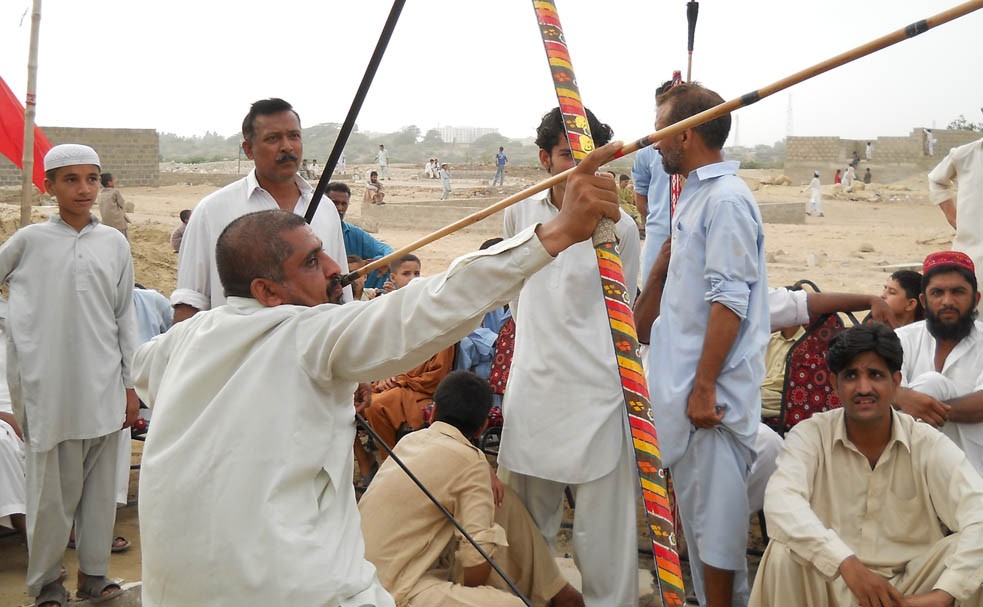
A small group of people is striving to keep the traditional sport of Makha alive by holding regular tournaments

With no support from the government, it is indeed a great challenge to keep centuries-old traditional games alive. Among them is Makha, or Mokha, as pronounced by some.
Makha, a traditional Pashtun version of archery, is mainly played in the heartland of Yousafzai tribe -- districts Buner, Swabi and Mardan and in some parts of Haripur in Khyber Pakhtunkhwa.
Last week, a tournament was held in Gulshen-e-Sikandarabad nieghbourhood in Keamari, Karachi, where dozens of people, including young and old, gathered in an open space to watch the final match of Makha.
In a simultaneous tournament in Mardan’s Babozai area, teams from Buner, Swabi and Mardan took part.
Similar to archery, Makha is played with a long arrow (ghashay in Pashto) and a long bow (leenda). The tip of the arrow is not sharp but is fixed with a flat round metal piece (tubray).
Interviews with Makha players and Pashtun activists reveal that archery was once a warfare tool. However, after the invention of modern weapons, Makha has become a mere game, played mainly in the land of Yousafzai tribe. People who emigrated from these districts to Karachi in 1960s have kept the game alive in their neighbourhoods by organising tournaments regularly.
The rules of the game are simple: archers play in teams of 12-10 competitors and two reserves and attempt to hit a small white wooden target, called takai in Pashto, 32 feet away from the archer. A circular ring secured in fresh clay surrounds the target. Each team suggests a community elder as a judge and it changes in every match.
Each player has his own arrow and bow. He shoots twice per round and the team with the most successful hits moves to the next round of the tournament.
Hassan Buneri, a Buner-based activist who organised the Makha tournament in Buner, says that players prefer to purchase arrow and bow from Jandol area in Dir, where it is made from the horns of Markhor, a wild goat found in mountainous forests. "Some also purchase it from Marghoz area of Swabi," he adds.
During the tournament, organisers also hire dhol players, who, after a shot on target, beat their instrument rhythmically, and are duly supported by blaring bajjay (horns) and dancing supporters. Also, in some tournaments, such as in Karachi, Pashto poets recite their poetries.
Makha tournaments are arranged usually in spring or after wheat harvest, when people are relatively free to play the game.
With the passage of time and popularity of other sports, this centuries-old traditional Pashtun sport is on the decline. But the Yousafzai tribesmen are striving to keep it alive. The organisers of the tournament and players are keen to revive and promote Makha in the city by organising regular tournaments.
Hatim Khan, 52, a Makha player in City Railway Colony area of Karachi, says that he has been playing this game for three decades in the city. "I learnt Makha in a tender age, and now I wish to teach my children how to play it."
Buneri says that promoting traditional games, such as Makha, can help us fight against various social evils and militancy. "Makha tournaments, so far, are mainly funded by the players. The government should start supporting the game financially."
However, he praised Ahsan Ali, former vice-chancellor of the Abdul Wali Khan University, Mardan, for promoting the Makha by organising tournaments.
Abubakkar Yousafzai, a cultural activist, says, "In Pashtun neighbourhoods, there are no parks and stadiums where people, especially youth, may spend free time". He says that local traditional games, including Makha, are a key source of enjoyment for people. "The government should organises Makha events regularly in every part of the city".